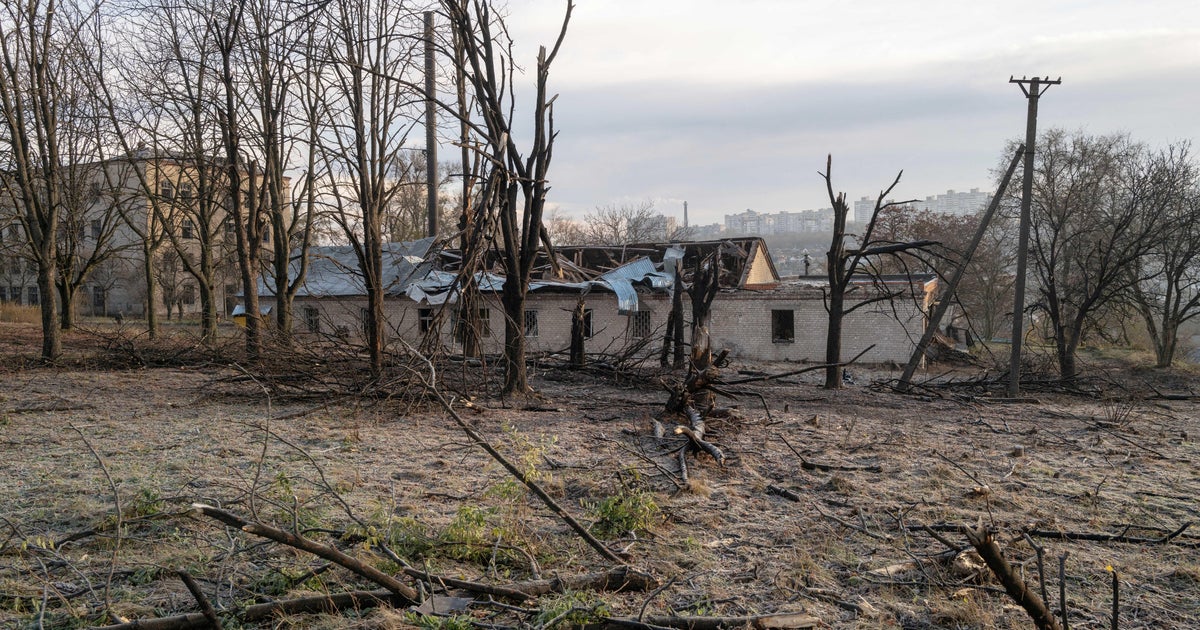CBS News
Yulia Navalnaya on why Alexei Navalny returned to Russia before his death | 60 Minutes

Yulia Navalnaya realized her husband, the late Russian dissident Alexei Navalny, would return to Russia as soon as he recovered from being poisoned in an attack he blamed on the Kremlin.
They knew the risks, but still there was no debate about whether returning to Russia was the right move, Navalnaya said. For them, it was a matter of when, not if, they would bring the fight against Vladimir Putin back to Russia.
“Of course, I would love to live all my life with my husband. But at that moment, I knew that there is just one decision which he could take,” she said. “And it was his decision. And I knew how important it was for him. And I knew that he wouldn’t be happy to live in exile.”
They were met by police, who arrested Navalny when he and Yulia returned to Russia in 2021. Navalny’s fight against Putin, his arrest and his time in prison before his February 2024 death are detailed in his posthumous memoir, “Patriot.”
How Navalny wrote “Patriot” while in prison
Navalny began working on his memoir, which comes out Oct. 22, while he was in Germany recovering from a 2020 assassination attempt that almost cost him his life. But much of it was written while in custody in Russia.
The opposition leader managed to maintain a presence on social media while in prison, keeping up his attacks on Putin. 60 Minutes has been asked not to say how Navalny managed to post online.
Navalnaya said the conditions her husband faced in Russia worsened each month because he kept speaking out against Putin. In “Patriot,” Navalny wrote that those conditions included “sleep deprivation,” “punitive solitary confinement” and almost no medical care. When none of that broke him, he was sent repeatedly to a “concrete black hole” called the “punishment cell.” He’d remain there for up to 15 days at a time.
Despite the conditions, he wrote that he was happy because he adored his work, knew he had support and because “I met a woman with whom I share not only love… but [who] is just as opposed as I am to what is going on.”
He managed to get his writing out while under constant surveillance.
“Alexei was very smart, very inventive,” Navalnaya said.
Navalny wrote that he devised an operation to bamboozle the guards, using identical notebooks and passing them on to someone during his court appearances.
“It was very difficult,” Navalnaya said. “That’s why we have diaries from the first year, much less from the second year, and not from the third year because it wasn’t possible.”
Taking up her late husband’s work
Navalny was tried and convicted several times on various pretexts in the years leading up to his death. His original three-and-a-half year sentence was extended to 19 years. After each verdict, he was moved to a different prison with harsher conditions. He was transferred to a penal colony north of the Arctic Circle last December.
The 47-year-old dissident’s final court appearance came just one day before his Feb. 16 death. Navalnaya posted a video message shortly after her husband’s death.
“Vladimir Putin killed my husband,” she said. “By killing Alexei, Putin killed half of me, half of my heart, and half of my soul.”
Navalnaya, once her husband’s silent partner, is now the leader of his opposition movement. She says the fight against Putin isn’t over. Her husband, she said, still has backing among the Russian people.
“He still has millions of supporters,” Navalnaya said of her late husband. “You can see it by how many people go still every day to his grave, how many flowers on his grave.”
60 Minutes
She’s also posted on X, formerly known as Twitter, that Putin’s place is in a Russian prison, in a small cell like the one her husband died in.
“He needs to be in Russian prison to feel everything,” she said. “What not just my husband, but all the prisoners in Russia [feel].”
What Navalnaya risks
Navalny’s political network in Russia has been crushed. Many members of his old team now operate out of Vilnius, Lithuania. Three of his lawyers are on trial in Russia, where Putin won his fifth term in March.
Navalnaya and her two children have been forced to live in exile. She’s constantly on the road, lobbying Western leaders to stand up to Putin.
Over the summer, a Russian court issued an arrest warrant for Navalnaya, but she remains defiant of Putin and unafraid — even though she knows she could face retaliation.
“I don’t want to live my life and to spend my life every day thinking about if they kidnap me today or tomorrow, if they are going to poison me today or tomorrow,” she said.
CBS News
Taste-testing “Sandwiches of History” – CBS News

Watch CBS News
Be the first to know
Get browser notifications for breaking news, live events, and exclusive reporting.
CBS News
“Sandwiches of History”: Resurrecting sandwich recipes that time forgot

Barry Enderwick is eating his way through history, one sandwich at a time. Every day from his home in San Jose, California, Enderwick posts a cooking video from a recipe that time forgot. From the 1905 British book “Salads, Sandwiches and Savouries,” Enderwick prepared the New York Sandwich.
The recipe called for 24 oysters, minced and mixed with mayonnaise, seasoned with lemon juice and pepper, and spread over buttered day-old French bread.
Rescuing recipes from the dustbin of history doesn’t always lead to culinary success. Sampling his New York Sandwich, Enderwick decried it as “a textural wasteland. No, thank you.” Into the trash bin it went!
But Enderwick’s efforts have yielded his own cookbook, a collection of some of the strangest – and sometimes unexpectedly delicious – historical recipes you’ve never heard of.
Harvard Common Press
He even has a traveling stage show: “Sandwiches of History Live.”
From the condiments to the sliced bread, this former Netflix executive has become something of a sandwich celebrity. “You can put just about anything in-between two slices of bread,” he said. “And it’s portable! In general, a sandwich is pretty easy fare. And so, they just have universal appeal.”
Though the sandwich gets its name famously from the Fourth Earl of Sandwich, the earliest sandwich Enderwick has eaten dates from 200 B.C.E. China, a seared beef sandwich called Rou Jia Mo.
He declared it delicious. “Between the onions, and all those spices and the soy sauce … oh my God! Oh man, this is so good!”
While Elvis was famous for his peanut butter and banana concoction, Enderwick says there’s another celebrity who should be more famous for his sandwich: Gene Kelly, who he says had “the greatest man sandwich in the world, which was basically mashed potatoes on bread. And it was delicious.”
Whether it’s a peanut and sardine sandwich (from “Blondie’s Cook Book” from 1947), or the parmesian radish sandwich (from 1909’s “The Up-To-Date Sandwich Book”), Enderwick tries to get a taste of who we were – good or gross – one recipe at a time.
RECIPE: A sophisticated club sandwich
Blogger Barry Enderwick, of Sandwiches of History, offers “Sunday Morning” viewers a 1958 recipe for a club sandwich that, he says, shouldn’t work, but actually does, really well!
MORE: “Sunday Morning” 2024 “Food Issue” recipe index
Delicious menu suggestions from top chefs, cookbook authors, food writers, restaurateurs, and the editors of Food & Wine magazine.
For more info:
Story produced by Anthony Laudato. Editor: Chad Cardin.
CBS News
The cream of the crop in butter

Watch CBS News
Be the first to know
Get browser notifications for breaking news, live events, and exclusive reporting.











